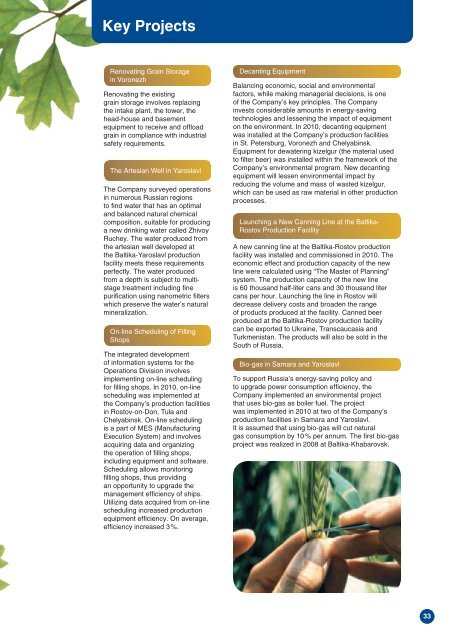Annual Report 2010 - Baltika Breweries
Annual Report 2010 - Baltika Breweries
Annual Report 2010 - Baltika Breweries
Create successful ePaper yourself
Turn your PDF publications into a flip-book with our unique Google optimized e-Paper software.
Key Projects<br />
Renovating Grain Storage<br />
in Voronezh<br />
Renovating the existing<br />
grain storage involves replacing<br />
the intake plant, the tower, the<br />
head-house and basement<br />
equipment to receive and offload<br />
grain in compliance with industrial<br />
safety requirements.<br />
The Artesian Well in Yaroslavl<br />
The Company surveyed operations<br />
in numerous Russian regions<br />
to find water that has an optimal<br />
and balanced natural chemical<br />
composition, suitable for producing<br />
a new drinking water called Zhivoy<br />
Ruchey. The water produced from<br />
the artesian well developed at<br />
the <strong>Baltika</strong>-Yaroslavl production<br />
facility meets these requirements<br />
perfectly. The water produced<br />
from a depth is subject to multistage<br />
treatment including fine<br />
purification using nanometric filters<br />
which preserve the water’s natural<br />
mineralization.<br />
On-line Scheduling of Filling<br />
Shops<br />
The integrated development<br />
of information systems for the<br />
Operations Division involves<br />
implementing on-line scheduling<br />
for filling shops. In <strong>2010</strong>, on-line<br />
scheduling was implemented at<br />
the Company’s production facilities<br />
in Rostov-on-Don, Tula and<br />
Chelyabinsk. On-line scheduling<br />
is a part of MES (Manufacturing<br />
Execution System) and involves<br />
acquiring data and organizing<br />
the operation of filling shops,<br />
including equipment and software.<br />
Scheduling allows monitoring<br />
filling shops, thus providing<br />
an opportunity to upgrade the<br />
management efficiency of ships.<br />
Utilizing data acquired from on-line<br />
scheduling increased production<br />
equipment efficiency. On average,<br />
efficiency increased 3 %.<br />
Decanting Equipment<br />
Balancing economic, social and environmental<br />
factors, while making managerial decisions, is one<br />
of the Company’s key principles. The Company<br />
invests considerable amounts in energy-saving<br />
technologies and lessening the impact of equipment<br />
on the environment. In <strong>2010</strong>, decanting equipment<br />
was installed at the Company’s production facilities<br />
in St. Petersburg, Voronezh and Chelyabinsk.<br />
Equipment for dewatering kizelgur (the material used<br />
to filter beer) was installed within the framework of the<br />
Company’s environmental program. New decanting<br />
equipment will lessen environmental impact by<br />
reducing the volume and mass of wasted kizelgur,<br />
which can be used as raw material in other production<br />
processes.<br />
Launching a New Canning Line at the <strong>Baltika</strong>-<br />
Rostov Production Facility<br />
A new canning line at the <strong>Baltika</strong>-Rostov production<br />
facility was installed and commissioned in <strong>2010</strong>. The<br />
economic effect and production capacity of the new<br />
line were calculated using “The Master of Planning”<br />
system. The production capacity of the new line<br />
is 60 thousand half-liter cans and 30 thousand liter<br />
cans per hour. Launching the line in Rostov will<br />
decrease delivery costs and broaden the range<br />
of products produced at the facility. Canned beer<br />
produced at the <strong>Baltika</strong>-Rostov production facility<br />
can be exported to Ukraine, Transcaucasia and<br />
Turkmenistan. The products will also be sold in the<br />
South of Russia.<br />
Bio-gas in Samara and Yaroslavl<br />
To support Russia’s energy-saving policy and<br />
to upgrade power consumption efficiency, the<br />
Company implemented an environmental project<br />
that uses bio-gas as boiler fuel. The project<br />
was implemented in <strong>2010</strong> at two of the Company’s<br />
production facilities in Samara and Yaroslavl.<br />
It is assumed that using bio-gas will cut natural<br />
gas consumption by 10 % per annum. The first bio-gas<br />
project was realized in 2008 at <strong>Baltika</strong>-Khabarovsk.<br />
33


